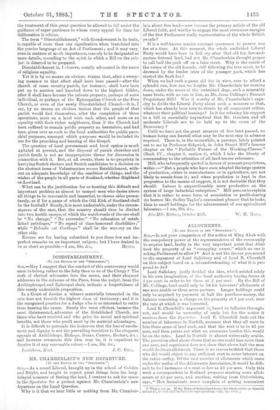MR. CHAMBERLAIN'S NEW DEPARTURE. rro THE EDITOR OF THE "
SPECTATOR." J -SIR,—As a sound Liberal, brought up in the school of Cobden and Bright, and taught to expect great things from the long- delayed measure of freeing the land, I venture to ask for space in the Spectator, for a protest against Mr. Chamberlain's new departure on the Land Question.
Why is it that we hear little or nothing from 'Mr. Chamber- nobles do, be will still be liable to erpropriation.—En. Sputator. J lain about free land—now become the primary article of the old Liberal faith, and worthy to engage the most strenuous energies of the first Parliament really representative of the whole British people ?
It is a well-known maxim amongst sportsmen to pursue one fox at a time. At this moment, the whole undivided Liberal Party would have been in full cry after that old fox, law-and- custom fettered land, had not Mr. Chamberlain thought proper to call half the pack off on a false scent. Why is the music of the voices of the old hounds, still following the true scent, to be drowned -by the louder cries of the younger pack, which has started the fresh fox ?
When we had such a game old fox in view, sure to afford a -splendid run, how can we forgive Mr. Chamberlain for turning down, under the noses of the untrained dogs, such a miserably tame brute, with no run in him, as Mr. Jesse Collings's Peasant Proprietary Bill P Was it worthy of Mr. Chamberlain's saga- city to divide the Liberal Party about such a measure as that, which has already been torn to shreds by all competent critics, whatever their political leanings ? Is it for refusing his support to a bill so essentially unpractical that Mr. Goschen and all moderate Liberals are to be held up to the scorn of the Democracy ?
Until we have got the great measure of free land passed, no --human being can foretell what. may be the next step in advance required. There is, in the meanwhile, a passage, lately pointed out to me by Professor Sidgwick, in John Stuart Mill's famous chapter on the "Probable Future of the Working-Classes" (Book IV., chapter 8, section 4), which I take the liberty of -commending to the attention of all land-tenure reformers.
who is frequently quoted in favour of peasant-proprietors, writes :—" Bat a people who have once adopted the large ayatem of production, either in manufactures or in agriculture, are not likely to recede-from it ; and -when population is kept in due proportion to the means Of support, it is not desirable that they should. Labour is unquestionably more productive on the system of large industrial enterprises." Mill goes on to explain that it is rather to some form of association or profit-sharing (to borrow Mr. Sedley Taylor's convenient phrase) that he looks, than to small holdings, for the advancement of our agricultural labourers.—I- am, Sir, &c.,
Six-Mile Bottom, October 26th. W. H. HALL.






































 Previous page
Previous page